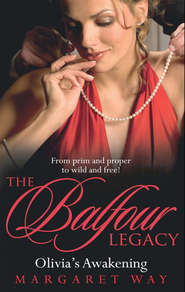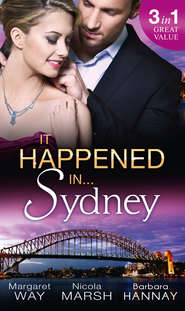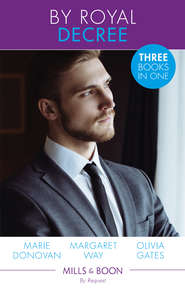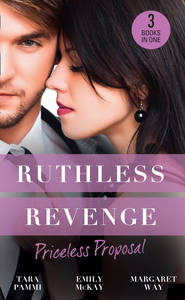По всем вопросам обращайтесь на: info@litportal.ru
(©) 2003-2024.
✖
Sarah's Baby
Автор
Год написания книги
2018
Настройки чтения
Размер шрифта
Высота строк
Поля
Sarah's Baby
Margaret Way
The McQueens are the town's founding family, and Ruth McQueen is their matriarch.She's a dangerous woman to cross, as Sarah Dempsey found out sixteen years ago. Pregnant and desperately in love with Ruth's adored grandson Kyall, Sarah stood up to Ruth - and was banished from the town. Now, all these years later, Sarah is a doctor, successful and highly regarded, but she's never forgotten Kyall or their baby. A baby Kyall didn't even know about. A baby girl who died shortly after birth…or did she?When Sarah returns to Koomera Crossing, when she and Kyall fall in love again, Ruth begins to feel threatened because her secrets are suddenly in jeopardy. And a threatened Ruth McQueen could cost Sarah not only the love of her life…but her life itself.
Koomera Crossing: Now and Then
At the present time, Ruth McQueen is in her seventies. Ruth’s heir, her beloved grandson Kyall, has fulfilled her every hope and dream. She loves him so much he can move her to tears, when she hasn’t shed a tear in all the years she’s been widowed.
Kyall will succeed her. Ruth can die happy. Kyall will marry well—a young woman Ruth approves of from an “exceptional” family. Since his early teens Kyall’s had all the girls falling madly in love with him. Girls from the right side of the tracks.
Only once did Kyall cross over into forbidden territory. It was about sixteen years ago…. This wasn’t the first time Ruth tampered with others’ lives, but it was the worst. She retains disturbing images of that particular year.
Not that Ruth wouldn’t do it all again. Ruth McQueen is used to disposing of threats, even if they come in the form of a fifteen-year-old girl. Ruth won’t have her beloved grandson’s life ruined. Everything she did, she did for him.
What does it matter that Kyall and Sarah Dempsey grew up together? That they formed a bond Ruth tried hard to destroy? For a grown woman to hate a mere child is demeaning. But it happened, and that hatred will continue unabated into the future.
In the end, Sarah brought the whole unhappy business to a halt. She got pregnant….
Dear Reader,
I’m currently involved in an exciting new project: a series of five books centered on the Outback town of Koomera Crossing in the Channel Country of far southwest Queensland, my home state. It’s an endlessly fascinating, unique part of Australia—a riverine desert on the fringe of the Wild Heart, which is what we call the vast 56,000 square miles of fiery red sand at the continent’s center. There are no permanent waters in the great Simpson Desert, but the Channel Country—by virtue of its natural irrigation system, a mighty filigree of tree-lined watercourses, billabongs, lagoons and swamps—is home to the nation’s cattle kings.
The Channel Country, even to other Australians, is as remote as the far side of the moon. This remoteness, the loneliness, the savage beauty and the overwhelming sheer empty vastness give the Never Never its glamorous mystique. Often described as one of the world’s harshest environments, the “Red Center” is transformed into paradise after rain. No one who has ever seen the incredible desert gardens, mile upon mile to the horizon, could ever forget such a sight.
My KOOMERA CROSSING stories are all set in this area. They are about the people who have been born and bred in the great Outback and will never leave it, and the people somehow damaged by life who find their way there, desperate for answers in the peace and freedom of the Outback. This is the land of the dreaming. Of miracles.
My first book in the series, Sarah’s Baby, a Superromance novel, is about a young woman raised in this Outback town who returns after many years of banishment as resident doctor at Koomera Crossing Bush Hospital. Sarah’s memories of her hometown are both glorious and devastating. Her journey home to Koomera Crossing, courageously undertaken, has far-reaching effects—far beyond anything she has imagined. Not only does fate give Sarah the chance to rebuild her shattered life, it steps in to reinforce what we all surely know: lies cannot be lived forever….
Margaret Way
Sarah’s Baby
Margaret Way
Sarah’s Baby
CONTENTS
PROLOGUE
CHAPTER ONE
CHAPTER TWO
CHAPTER THREE
CHAPTER FOUR
CHAPTER FIVE
CHAPTER SIX
CHAPTER SEVEN
CHAPTER EIGHT
CHAPTER NINE
CHAPTER TEN
CHAPTER ELEVEN
CHAPTER TWELVE
CHAPTER THIRTEEN
CHAPTER FOURTEEN
CHAPTER FIFTEEN
CHAPTER SIXTEEN
EPILOGUE
PROLOGUE
Koomera Crossing
Outback Queensland
Australia
THIS IS THE TOWN. About as far off the beaten track as one can get. Roughly a thousand miles from the dynamic cosmopolitan cities of the continent’s seaboard, where the bulk of the population lives. This is the Australian outback. The Never Never where the power of nature prevails and love for the ancient landscape suffuses life. It’s what makes the outback unique.
Here the creeks run dry or ten feet high, bursting their banks and spilling their iridescent green waters across the fiery red sands. It’s either drought or flood. One follows the other without break. But when the floods recede? The drought-ravaged country is transformed into a wildflower-swept paradise.
The red plains, parched and quivering under the all-powerful sun, are overnight transformed into a blindingly beautiful undulating ocean of brilliant yellow and white as zillions of paper daisies sprout with astonishing momentum from the reenergized soil. The lonely sun-scorched desert tracks, once trod by brave explorers and their chosen men, are obscured by a mantle of pure magic. Exquisite ephemeral plants create a kaleidoscope of colors—the scarlet desert peas, the felty bellflowers, woolly foxgloves, the succulent pink parakeelya, the fluffy lilac mulla mullas and the lime pussy tails, the native hibiscus and the thickets of pink and white rain lilies, the pure white Carpet of Snow that so gloriously embroiders the bloodred sands. These are the miraculous sights that give the Inland its fascination. These glimpses into heaven affect the lives of outback people like the hand of God upon their hearts. They can live in no other place on earth, despite all the hardships and isolation. They will never leave and if they do, they always return.
The town of Koomera Crossing is on the desert fringe. In the early days of settlement, it was called O’Connor’s Waterhole in memory of one of the most romantic and foolhardy of explorers, Sweeney O’Connor, a young Irish adventurer who once enjoyed a spell in an English jail before being put on a boat to Botany Bay, where the good colonists were shocked by his howling hotheadedness and lunatic ideas.
O’Connor, to no one’s surprise, all but perished on the site of the town. This was in the early 1800s when he was well into his doomed trek to find the fabled inland sea. Many Europeans in those days were convinced that a sea lay at the continent’s center when it really lay underground in the Great Artesian Basin. Only O’Connor’s fervent prayers—and he later confessed he had to dig deep to remember any—and the intervention of a great thunderstorm plucked him from the greedy arms of death. Life-giving water filled the dry creek bed where he and his faithful Indian sepoy, Gopal, had made camp, along with their four camels and small herd of goats. Ironically, the lot of them nearly drowned in the flash flood, although they emerged on dry land, smiling and blessing their various gods.
Instead of the inland sea O’Connor had boasted he would swim in, he found a land of savage grandeur, blazing heat, vivid color and monstrous rock formations that had the power to undergo spectacular color changes. To O’Connor’s eyes, it was “the most violent, most bizarre environment on God’s earth” until it was refreshed and reborn by rain. Hell and paradise as a matter of course.
That long-ago thunderstorm saved O’Connor’s life although he was to die at the age of twenty-nine, a scant two years later with an Aboriginal spear sunk deep in his belly. A tragic end, the more so since he’d left behind someone he loved with a baby kicking in her womb.
When the fledgling sheep stations started to prosper and the settlement developed into a service town, O’Connor’s Waterhole, already elevated to O’Connor’s Crossing, reverted to its Aboriginal name. Koomera refers to a stopping place with plenty of moojungs (birds), nerrigundahs (berries) and a rock pool or waterhole (koomera). So Koomera Crossing became a place of safety and promise. A place where a man had the opportunity to make a new life for himself, where he could raise a family. Or hide. These were the men who broke rules. Men who rebelled against the confines of the city. These were the adventurers and the visionaries and—it has to be said—a few out-and-out villains.
At the present time, some fifteen hundred people call this outback shire home. A relative handful of people with vast, majestic, open spaces to themselves. Everyone in town knows what everyone else is doing; at least they all like to think they do. In any event, gossip whips around Koomera Crossing like the wind in a dust storm. It’s always that way in a bush town, but the community is closely knit, its members unfailingly supportive of one another in time of need.
Margaret Way
The McQueens are the town's founding family, and Ruth McQueen is their matriarch.She's a dangerous woman to cross, as Sarah Dempsey found out sixteen years ago. Pregnant and desperately in love with Ruth's adored grandson Kyall, Sarah stood up to Ruth - and was banished from the town. Now, all these years later, Sarah is a doctor, successful and highly regarded, but she's never forgotten Kyall or their baby. A baby Kyall didn't even know about. A baby girl who died shortly after birth…or did she?When Sarah returns to Koomera Crossing, when she and Kyall fall in love again, Ruth begins to feel threatened because her secrets are suddenly in jeopardy. And a threatened Ruth McQueen could cost Sarah not only the love of her life…but her life itself.
Koomera Crossing: Now and Then
At the present time, Ruth McQueen is in her seventies. Ruth’s heir, her beloved grandson Kyall, has fulfilled her every hope and dream. She loves him so much he can move her to tears, when she hasn’t shed a tear in all the years she’s been widowed.
Kyall will succeed her. Ruth can die happy. Kyall will marry well—a young woman Ruth approves of from an “exceptional” family. Since his early teens Kyall’s had all the girls falling madly in love with him. Girls from the right side of the tracks.
Only once did Kyall cross over into forbidden territory. It was about sixteen years ago…. This wasn’t the first time Ruth tampered with others’ lives, but it was the worst. She retains disturbing images of that particular year.
Not that Ruth wouldn’t do it all again. Ruth McQueen is used to disposing of threats, even if they come in the form of a fifteen-year-old girl. Ruth won’t have her beloved grandson’s life ruined. Everything she did, she did for him.
What does it matter that Kyall and Sarah Dempsey grew up together? That they formed a bond Ruth tried hard to destroy? For a grown woman to hate a mere child is demeaning. But it happened, and that hatred will continue unabated into the future.
In the end, Sarah brought the whole unhappy business to a halt. She got pregnant….
Dear Reader,
I’m currently involved in an exciting new project: a series of five books centered on the Outback town of Koomera Crossing in the Channel Country of far southwest Queensland, my home state. It’s an endlessly fascinating, unique part of Australia—a riverine desert on the fringe of the Wild Heart, which is what we call the vast 56,000 square miles of fiery red sand at the continent’s center. There are no permanent waters in the great Simpson Desert, but the Channel Country—by virtue of its natural irrigation system, a mighty filigree of tree-lined watercourses, billabongs, lagoons and swamps—is home to the nation’s cattle kings.
The Channel Country, even to other Australians, is as remote as the far side of the moon. This remoteness, the loneliness, the savage beauty and the overwhelming sheer empty vastness give the Never Never its glamorous mystique. Often described as one of the world’s harshest environments, the “Red Center” is transformed into paradise after rain. No one who has ever seen the incredible desert gardens, mile upon mile to the horizon, could ever forget such a sight.
My KOOMERA CROSSING stories are all set in this area. They are about the people who have been born and bred in the great Outback and will never leave it, and the people somehow damaged by life who find their way there, desperate for answers in the peace and freedom of the Outback. This is the land of the dreaming. Of miracles.
My first book in the series, Sarah’s Baby, a Superromance novel, is about a young woman raised in this Outback town who returns after many years of banishment as resident doctor at Koomera Crossing Bush Hospital. Sarah’s memories of her hometown are both glorious and devastating. Her journey home to Koomera Crossing, courageously undertaken, has far-reaching effects—far beyond anything she has imagined. Not only does fate give Sarah the chance to rebuild her shattered life, it steps in to reinforce what we all surely know: lies cannot be lived forever….
Margaret Way
Sarah’s Baby
Margaret Way
Sarah’s Baby
CONTENTS
PROLOGUE
CHAPTER ONE
CHAPTER TWO
CHAPTER THREE
CHAPTER FOUR
CHAPTER FIVE
CHAPTER SIX
CHAPTER SEVEN
CHAPTER EIGHT
CHAPTER NINE
CHAPTER TEN
CHAPTER ELEVEN
CHAPTER TWELVE
CHAPTER THIRTEEN
CHAPTER FOURTEEN
CHAPTER FIFTEEN
CHAPTER SIXTEEN
EPILOGUE
PROLOGUE
Koomera Crossing
Outback Queensland
Australia
THIS IS THE TOWN. About as far off the beaten track as one can get. Roughly a thousand miles from the dynamic cosmopolitan cities of the continent’s seaboard, where the bulk of the population lives. This is the Australian outback. The Never Never where the power of nature prevails and love for the ancient landscape suffuses life. It’s what makes the outback unique.
Here the creeks run dry or ten feet high, bursting their banks and spilling their iridescent green waters across the fiery red sands. It’s either drought or flood. One follows the other without break. But when the floods recede? The drought-ravaged country is transformed into a wildflower-swept paradise.
The red plains, parched and quivering under the all-powerful sun, are overnight transformed into a blindingly beautiful undulating ocean of brilliant yellow and white as zillions of paper daisies sprout with astonishing momentum from the reenergized soil. The lonely sun-scorched desert tracks, once trod by brave explorers and their chosen men, are obscured by a mantle of pure magic. Exquisite ephemeral plants create a kaleidoscope of colors—the scarlet desert peas, the felty bellflowers, woolly foxgloves, the succulent pink parakeelya, the fluffy lilac mulla mullas and the lime pussy tails, the native hibiscus and the thickets of pink and white rain lilies, the pure white Carpet of Snow that so gloriously embroiders the bloodred sands. These are the miraculous sights that give the Inland its fascination. These glimpses into heaven affect the lives of outback people like the hand of God upon their hearts. They can live in no other place on earth, despite all the hardships and isolation. They will never leave and if they do, they always return.
The town of Koomera Crossing is on the desert fringe. In the early days of settlement, it was called O’Connor’s Waterhole in memory of one of the most romantic and foolhardy of explorers, Sweeney O’Connor, a young Irish adventurer who once enjoyed a spell in an English jail before being put on a boat to Botany Bay, where the good colonists were shocked by his howling hotheadedness and lunatic ideas.
O’Connor, to no one’s surprise, all but perished on the site of the town. This was in the early 1800s when he was well into his doomed trek to find the fabled inland sea. Many Europeans in those days were convinced that a sea lay at the continent’s center when it really lay underground in the Great Artesian Basin. Only O’Connor’s fervent prayers—and he later confessed he had to dig deep to remember any—and the intervention of a great thunderstorm plucked him from the greedy arms of death. Life-giving water filled the dry creek bed where he and his faithful Indian sepoy, Gopal, had made camp, along with their four camels and small herd of goats. Ironically, the lot of them nearly drowned in the flash flood, although they emerged on dry land, smiling and blessing their various gods.
Instead of the inland sea O’Connor had boasted he would swim in, he found a land of savage grandeur, blazing heat, vivid color and monstrous rock formations that had the power to undergo spectacular color changes. To O’Connor’s eyes, it was “the most violent, most bizarre environment on God’s earth” until it was refreshed and reborn by rain. Hell and paradise as a matter of course.
That long-ago thunderstorm saved O’Connor’s life although he was to die at the age of twenty-nine, a scant two years later with an Aboriginal spear sunk deep in his belly. A tragic end, the more so since he’d left behind someone he loved with a baby kicking in her womb.
When the fledgling sheep stations started to prosper and the settlement developed into a service town, O’Connor’s Waterhole, already elevated to O’Connor’s Crossing, reverted to its Aboriginal name. Koomera refers to a stopping place with plenty of moojungs (birds), nerrigundahs (berries) and a rock pool or waterhole (koomera). So Koomera Crossing became a place of safety and promise. A place where a man had the opportunity to make a new life for himself, where he could raise a family. Or hide. These were the men who broke rules. Men who rebelled against the confines of the city. These were the adventurers and the visionaries and—it has to be said—a few out-and-out villains.
At the present time, some fifteen hundred people call this outback shire home. A relative handful of people with vast, majestic, open spaces to themselves. Everyone in town knows what everyone else is doing; at least they all like to think they do. In any event, gossip whips around Koomera Crossing like the wind in a dust storm. It’s always that way in a bush town, but the community is closely knit, its members unfailingly supportive of one another in time of need.











